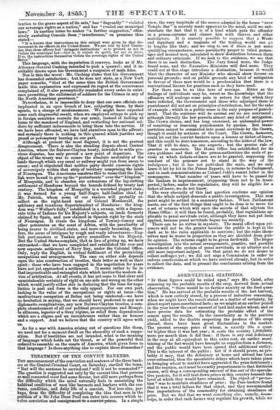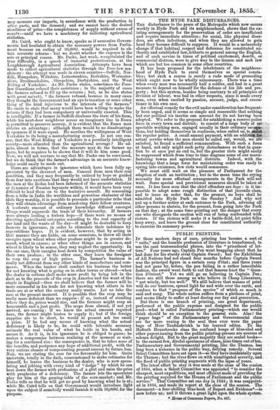AGRICULTURAL STATISTICS.
" IF these figures could be relied upon," says Mr. Caird, after summing up the probable results of the crop, derived from actual observation, " there would be no further anxiety on the food ques- tion." He has arrived at the probable results of the last harvest, which is now entirely stored, by a process of inductive reasoning, when we might have the result stated as a matter of certainty, by direct report upon ascertained facts ; as we might at an earlier period in the year know the exact amount of land laid under wheat, and so have precise data for estimating the probable effect of the season upon the results. In the uncertainty as to the positive
yield, added to the doubts respecting the produce of crops abroad, there have been great fluctuations in the market. The present average price of wheat, is exactly 20s. a quar- ter higher than it was last year ; it costs the country 1,500,0001 more per month than it did then : if there is any real deficiency in the crop at all equivalent to this extra cost, an earlier ascer- taining of the fact would have brought us supplies from a distance, and the public would have been spared that additional outlay. This is the interest of the public ; but if it should prove, as pro- bably it may, that the deficiency at home and abroad has been over-estimated, then the speculative delays which have taken place in bringing wheat to market have aggravated the price fictitiously ; and the reaction, as it must be exactly proportionate to that fictitious excess, will drag a corresponding amount of fine out of the specula- tive pockets, for it-will beat down prices in this country beneath the level at which they would have remained. The object of "protec- tion" was to maintain steadiness of price ; the Free-traders found that it was a total failure for that object, and they recommended free importations of the commodity for obtaining steadiness of price. But we find that we want something else, namely, know- ledge, in order that each farmer may regulate his growth, while we
may measure our imports, in accordance with the production in other parts, and the demand; and we cannot have the desired steadiness of price—the completeness of supply without excess of supply—until we have a machinery for collecting agricultural statistics.
Mr. Caird, who ought to know, speaks as if successive Govern- ments had hesitated to obtain the necessary powers from Parlia- ment because an outlay of 30,000/. would be required to ob- tain accurate returns : but we doubt whether the expense is the sole or principal reason. Mr. Packe, last week, recapitulated the true difficulty, in a speech of immortal protectionism, at the Loughborough Agricultural Association. Attempts have been made to collect agricultural statistics through the Poor-law ma- chinery : the attempt was made in eleven counties—Suffolk, Nor- folk, Hampshire, Wiltshire, Leicestershire, Berkshire, Worcester- shire, Brecknockshire, Shropshire, Derbyshire, and the West Riding of Yorkshire. As Mr. Packe states, sometimes the Poor- law Guardians refused their assistance ; in the majority of cases the farmers refused to fill up the returns ; but, as he also states with great naiveté, " the farmers refused, because in many cases they thought the Government had an eye to taxation or some other thing of the kind injurious to the interests of the farmers." He omits to state that many would have been willing to make the returns if they had been compulsory or universally exacted. This is intelligible. If a farmer in Suffolk discloses the state of his farm, while his next-door neighbour across an imaginary line in Essex is permitted to preserve secrecy, it is evident that the Essex man obtains an advantage ; although there would be no disadvantage in openness if it were equal. He ascribes the willingness of West Yorkshire to its being a manufacturing county. Is not one rea- son, that the West Riding of Yorkshire is a peculiarly intelligent county—more educated than the agricultural average ? He ad- mits, almost in terms, that the measure may do the farmer no harm, but he requires to be shown that it will do him some good. Now, we will not venture to say that Mr. Packe can be convinced, but we do think that the farmer's advantage in an accurate know- ledge could easily be made out.
There are advantages in ignorance which have been fully ap- preciated by the cleverest of men. Conceal from men their real condition, and they may frequently be enticed by hope or guided from fear into exertions that they would not have undertaken. If the men at the Redan had been informed of the accurate statistics or dynamics of Russian bayonets within, it would have been very difficult to lead them on to the tentative assault. By concealing from a tribe in India the worthless and powerless character of the idols they worship, it is possible to persuade a particular tribe that they will obtain advantage from murdering their fellow creatures. A moderate amount of ordinary knowledge diffused amongst Thugs would supersede the trade of their hierarchy. If farmers were always leading a forlorn hope—if there were no means of directing agricultural enterprise according to the real capacity of our land and the wants of the day—it might be desirable to keep farmers in ignorance, in order to stimulate their indolence by superstitious hopes. It is evident, however, that by acting in that manner they are liable, on some occasions, to throw all their energies upon wheat when other produce might be in greater de- mand, wheat in excess; or when other things are in excess, and wheat is likely to be scarce, they may neglect the opportunity. In the one case, their energies beat down by competition the value of their own produce ; in the other case, they leave the foreigner to reap the crop of high prices. The farmer's business is really not different from any other kinds of manufacture and com- merce. When the banker shall conduct his business the better for not knowing what is going on in other towns or abroad—when the dealer in cottons shall make more profit by being left in the dark as to the proceeds of the crop in America and the want of the staple in England—then we shall believe that the farmer will be more successful in his trade for not knowing what others in his trade are at or what the country really wants. Let us take the case at the present moment. It is possible that the crop may be really more deficient than we suppose : if so, instead of standing where they do, prices would rise, and the farmers might reap an honourable and a just profit. The crops from abroad, if not yet arrived, are coming : if we knew the actual amount required here, the farmer might hasten to supply it; but if the foreign supplies ace to be short, he would at present ask too small a price. If he had any means of knowing what the actual deficiency is likely to be, he could with tolerable accuracy estimate the real value of what he holds in his hands, and secure it. As it is, in his ignorance he is obliged to guess; he makes a compromise between realizing at the moment or wait- ing for a continued rise : the consequence is, that he takes some of the benefits, and postpones any hope of additional profit, with the very serious chance of compensating present success by future loss. Nay, we are stating the case far too favourably for him. Quite uncertain, totally in the dark, unaccustomed to make estimates for himself, he leaves the business to the dealer, who is now specu- lating and jobbing with every kind of " dodge " by which he can beat down the farmer with professions of a glut and raise the price with prophecies of a deficiency. The farmer lets the speculator play for him at the gaming-table of the corn-market ; and Mr. Packe tells us that he will get no good by knowing what he is at; while Mr. Caird tells us that Government would introduce light upon the subject if somebody would furnish it with 30,0001. for the purpose.



























 Previous page
Previous page